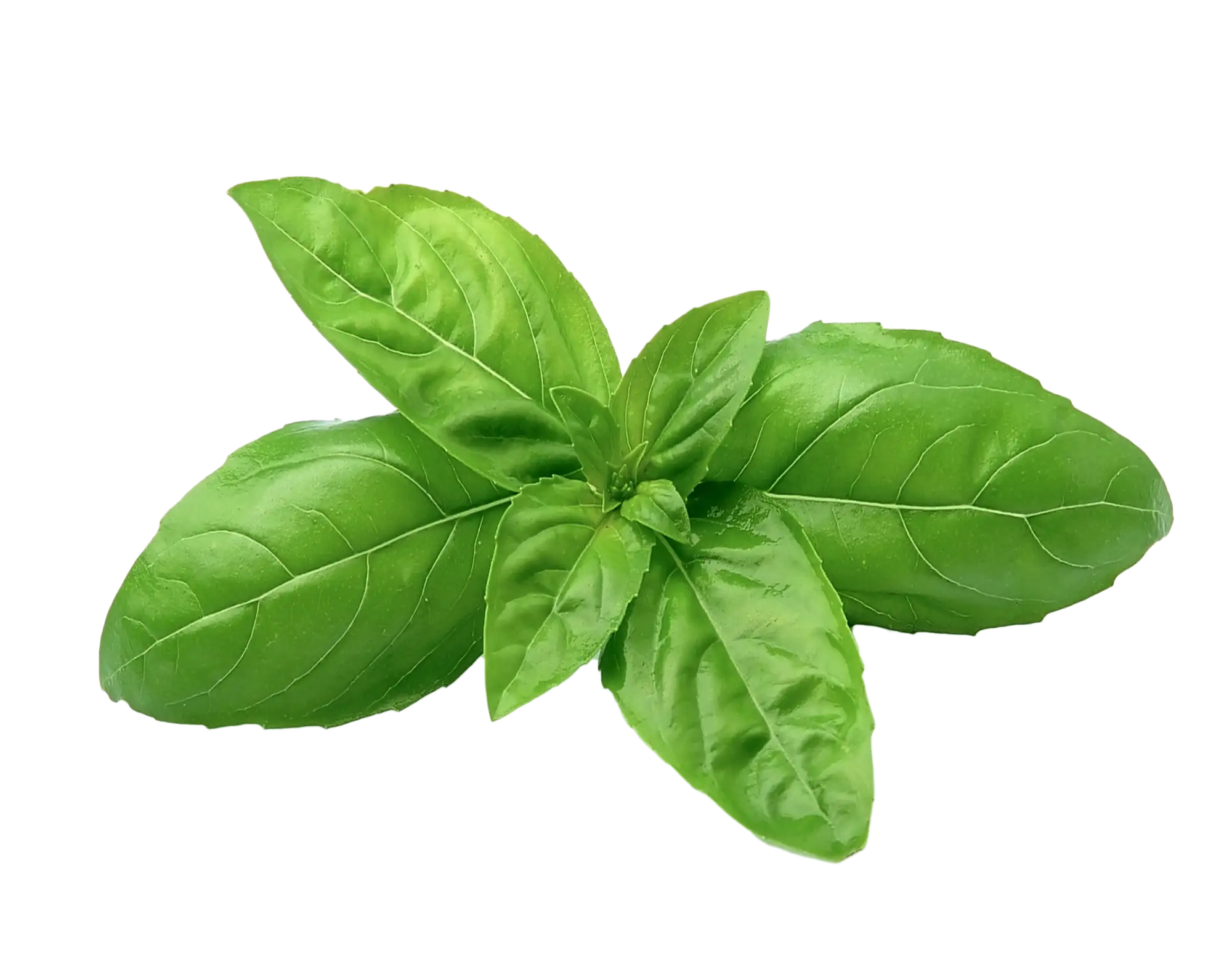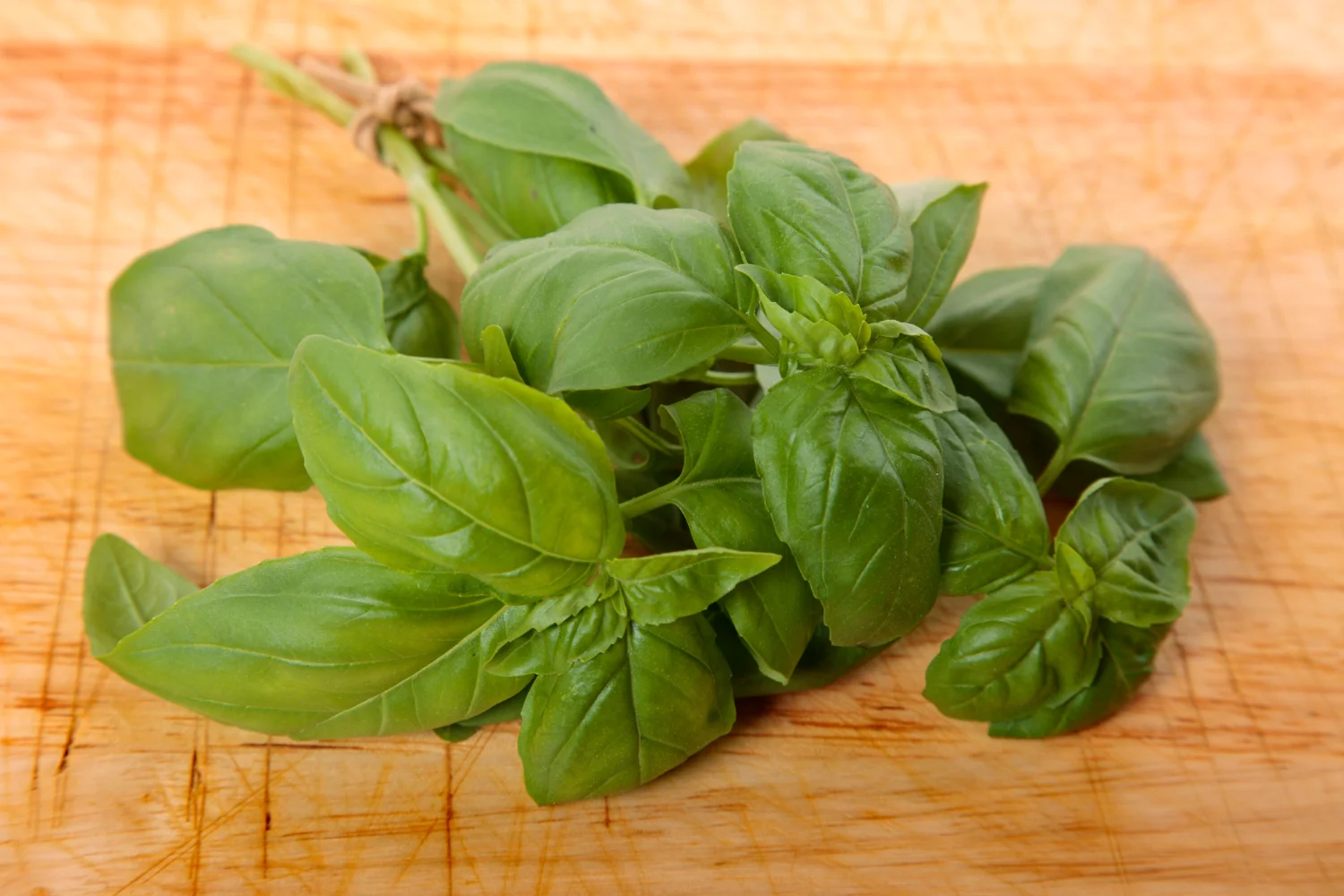Basil essential oil
Ocimum basilicum
Basil (Ocimum basilicum), commonly referred to as sweet basil, is one of the most beloved herbs in the world, valued for both its culinary versatility and its wide range of therapeutic benefits. With a rich history that spans thousands of years, basil has been a staple in many cultures, cuisines, and traditional medicine practices. Its bright green leaves and aromatic essence make it not only a flavorful ingredient but also a natural remedy for various ailments. This guide delves deep into the fascinating world of basil, exploring its history, uses, health effects, and the benefits of basil essential oil.
There are many varieties of basil, each with distinct flavors and aromas. Sweet basil (Ocimum basilicum) is the most common variety, but others like Thai basil, lemon basil, and purple basil are also popular in specific cuisines and herbal remedies.
Historical Background
The history of basil dates back over 5,000 years, with its origins believed to be in tropical regions of Asia and Africa. It quickly spread to other parts of the world, becoming an integral part of many cultures. In India, basil holds a sacred status, particularly the variety known as holy basil or tulsi (Ocimum sanctum), which is revered in Hinduism. Ancient Egyptians also loved basil for its spiritual significance and medicinal properties. It was used in embalming rituals to ensure a safe passage to the afterlife. Meanwhile, in Europe, basil gained popularity through trade routes and became a symbol of love and prosperity in Italy. Italian cuisine, in particular, embraced basil as a key ingredient, leading to its iconic use in dishes like pesto and caprese salad.

Scent description
Warm, spicy, herbaceous, slightly minty
Usage
Inhaled | topically | internally
Effects, use cases
Stimulant | regenerative | antispasmodic | anti-inflammatory | antibacterial | digestive | fatigue | earache | loss of smell | migraine | dizziness | mental exhaustion | cramps | nausea | PMS | muscle aches
Warning, safety cautions
Essential oils are not intended to diagnose, treat, or prevent any disease, nor do they replace medications or therapies prescribed by a physician. They are not medicinal products and do not qualify as drugs. Based on experience, essential oils may have complementary therapeutic effects. If you are unsure about how an essential oil might affect you or your child, consult your general practitioner and/or a qualified aromatherapist. Before using any new essential oil (especially internally or directly on the skin), perform a patch test.
Medicinal uses and health effects of basil essential oil
Beyond its culinary uses, basil has a long history of medicinal use. The herb is rich in bioactive compounds, including essential oils and polyphenols, which contribute to its therapeutic properties. Basil is known for its antimicrobial, anti-inflammatory, and antioxidant effects, making it a valuable natural remedy for a range of health issues.
One of basil’s primary medicinal benefits is its ability to combat bacteria, fungi, and viruses. Compounds like linalool and eugenol exhibit potent antimicrobial properties, helping to prevent infections and support immune health. Additionally, basil contains rosmarinic acid, a powerful antioxidant that helps reduce oxidative stress and inflammation in the body.
Basil essential oil, extracted through steam distillation of the leaves and flowering tops, is a concentrated source of the plant’s active compounds. The oil is pale yellow and has a warm, spicy, and herbaceous scent that is both invigorating and soothing.
Basil essential oil is widely used in aromatherapy for its ability to enhance mood, reduce stress, and promote mental clarity. Its uplifting aroma helps to improve focus and concentration, making it a popular choice for diffusers in workspaces and meditation areas.
Topically, basil essential oil can be applied (when diluted with a carrier oil) to relieve muscle aches, joint pain, and tension. Its antimicrobial properties also make it useful for treating minor wounds, insect bites, and skin infections. Additionally, basil essential oil acts as a natural insect repellent, helping to keep mosquitoes and other pests at bay.

How to use Basil essential oil?
Exhaustion
Apply directly under your nose, massage into the soles of your feet, the back of your neck, and your forehead.
Muscle soreness
Massage into the area of muscle soreness.
Loss of smell
Apply directly under your nose.
Mental exhaustion
Inhale 1 drop directly from your palms, diffuse, or apply to your forehead.
PMS
Massage into your abdomen and lower back at the level of your ovaries.
Earache
Apply behind and under your ears.
Migraines and dizziness
Apply to your temples and the back of your neck.
Nausea, cramps
Take 1 drop in an empty capsule or massage into your stomach/abdominal area (ONLY safe to use internally oil brands!).
Warning, safety cautions
Essential oils are not intended to diagnose, treat, or prevent any disease, nor do they replace medications or therapies prescribed by a physician. They are not medicinal products and do not qualify as drugs. Based on experience, essential oils may have complementary therapeutic effects. If you are unsure about how an essential oil might affect you or your child, consult your general practitioner and/or a qualified aromatherapist. Before using any new essential oil (especially internally or directly on the skin), perform a patch test.
Basil essential oil – spirituality and soul
Basil holds a significant place in spiritual practices, with a deep-rooted history in various religious and cultural traditions. In Hinduism, holy basil or tulsi is considered a sacred plant, often associated with the goddess Lakshmi, symbolizing purity, protection, and prosperity. It is believed to purify the aura, ward off negative energies, and promote spiritual well-being.
Meditation
Diffusing basil essential oil during meditation can help create a calm and focused atmosphere, encouraging spiritual insight and heightened awareness.
Protective qualities
Basil and basil essential oil is also known for its protective qualities. It has been used in various rituals to safeguard against evil influences and to bless homes. In Italian folklore, basil was seen as a symbol of love and devotion, often used in rituals to attract harmony and positive relationships.
Emotional healing
The spiritual effects of basil extend to emotional healing as well. Its calming properties help release stress, anxiety, and emotional tension, promoting a sense of inner peace. When used in aromatherapy, basil can help balance the mind and emotions, fostering a deeper connection to oneself and the surrounding world.
Divine connection
In many cultures, basil has been regarded as a plant of divine connection. Its fresh, aromatic scent is thought to uplift the spirit and clear the mind, making it an ideal companion for meditation and prayer.
Recommended manufacturers of Basil essential oil
dōTERRA
Basil essential oil is currently available from dōTERRA.
For further information, visit the dōTERRA website.
Young Living
Young Living is currently selling Basil essential oil.
For further information, visit the Young Living website.
Contact info
Author:
Roseware Kft. - Réka Rózsáné Illés
Affiliate programs
I am open to be the part of affiliate programs with essential oil manufacturers and sellers. Contact me!
Copyright info
Photos and texts on this website are subjects of copyright - the owner of the copyright is Roseware Kft. - Réka Rózsáné Illés. Do not use any of these without permission.
